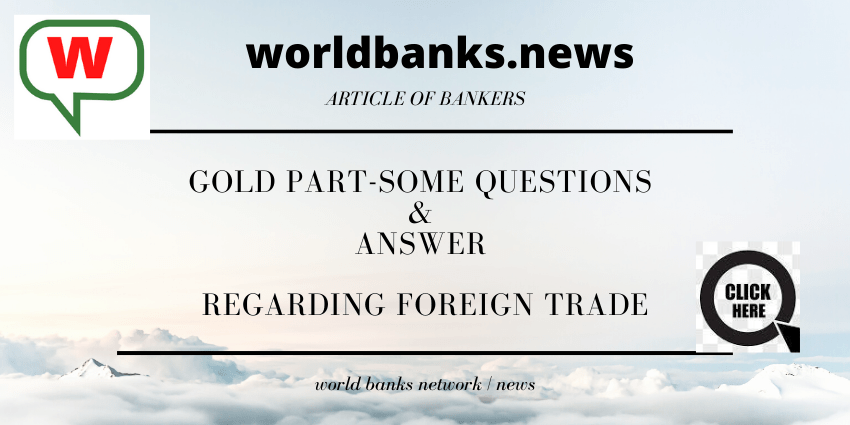Gold Part-Some questions & Answer regarding Foreign Trade
-
What is retirement of LC
- Adjustment of PAD account and handover the transport documents to the applicant (importer)
-
Which rate we applying for LC Opening
- BC Selling
-
Which rate we apply for purchase of at sight documents
- OD SIGHT EXPORT
-
What is LIBOR
- London Inter Bank Offer Rate
-
What is DIBOR
- Dhaka Inter Bank Offer Rate
-
When documents are discrepant
- When the document are not complied with LC , UCPDC 600 and ISBP.
-
Discrepancy notice
- Within 05 banking days
-
What is responsibility of issuing Bank
- Issuance of LC and assurance of payment
-
What is responsibility of Advising Bank
- Authenticity of LC and advice to the beneficiary
- What is responsibility of Confirming Bank
- Assurance of payment requested by the issuing bank
-
What is responsibility of Negotiating Bank
- Honour the value of bill presented
-
What is responsibility of Reimbursing Bank
- Fund transfer by the request of Issuing bank by debiting the nostro account with them
- What Correspondence relationship
- The relationship between two banks. (One local bank other is foreign bank)
-
Meaning of BKE
- Bilateral Key Exchange
-
What is substitution of documents
- Replace of commercial invoice and bill of exchange of documents buy the first beneficiary
- Substitution of documents can be done if first beneficiary transfers the LC to the second beneficiary.
-
Meaning of REPO:
- Reposition
-
What is FEX market
- Global system of permanent telephone, telegraph and computer links between buyers and sellers of foreign currency at non-banks and foreign exchange traders at banks and between foreign exchange traders themselves. Place where exchange rates are set.
-
Components of derivative market
Forwards Futures Options Hedging Capping Swaps Arbitrage
-
Relationship between money & fex. Market
- There is a co-relationship between the markets. (They are related to each other)
-
Source Tax ON export:
- 60%
-
Tax on Buying comm.:
- 5%
- Tax on Indenting comm.:
- 50%
-
What is Bill of Exchange
- A “Bill of Exchange” is an instrument in writing containing an unconditional order, signed by the maker directing a certain person to pay a certain sum of money only to, or to the order of, a certain person or to the bearer of the instrument.
-
MEANING OF URR-725
- Uniform rules for bank to bank reimbursement-725
- Meaning of URC-522
- Uniform Rules for Collection-522
-
WHAT IS THE DIFFERENCE BETWEEN REIMBURSEMENT UNDERTAKING & AUTHORASATION?
- Reimbursement Undertaking” shall mean a separate irrevocable undertaking of the Reimbursing Bank, issued upon the authorization or request of the Issuing Bank, to the Claiming Bank named in the Reimbursement Authorization, to honour that bank’s Reimbursement Claim provided the terms and conditions of the reimbursement Undertaking have been complied with.
- Reimbursement Authorization shall mean an instruction and/or authorization, independent of the Credit, issued by an Issuing Bank to a Reimbursing Bank to reimburse a Claiming Bank, or, if so requested by the Issuing Bank, to accept and pay time draft(s) drawn on the Reimbursing Bank.
-
TYPES OF EXPORT INCENTIVES
Currency Convertibility ERQ International credit card Travel quota for new exporter Fiscal Incentives Cash Incentives Duty Drawback
-
WHAT IS NEGOTIATION UNDER RECOURSE
- Negotiation under certain conditions.
-
What is Indemnity
- A Contract of Indemnity is defined, under section 12, as a contract by which one party promises to save the other (beneficiary) from loss caused to him by the conduct of the promisor (indemnifier) himself, or by the conduct of any other person.” For example, if the consignee of goods sent by rail has lost the railway receipt, he may take delivery of the goods from the railways by furnishing an indemnity bond. He promises to reimburse the railway any loss that may be caused to it by giving delivery of the goods without the receipt.
-
Foreign Currency is a commodity or not:
- Commodity
-
What is revaluation
- Downward movement in an exchange rate. Opposite of depreciation / devaluation.
-
What is devaluation
- Rise in the exchange rate of a currency; in the case of floating exchange rates, the currency depreciates in the currency markets, altering the price paid in domestic currency for one unit of a foreign currency. In the case of fixed exchange rates, the parity of the domestic currency is officially raised against the foreign currency (price of one unit of the foreign currency expressed in domestic currency).
- What is inflation
- Reduction in purchasing power as a result of persistent price rises.
-
What is Dealing Room & steps of dealing room:
- Dealing Room deals with:
Settlement of the deal (sending of payment instruction and receiving funds from the counter party), Balancing of position, Checking of deals for accuracy, Authorization of payment, Counter-party confirmation, Limit monitoring, Revaluation procedure, Reconciliation of Nostro Accounts
Front office Treasury Functional Organization, Market Terminology and Dealing Practices, FX Products- Spots, Forwards, Swaps, FX Positioning, Limits Compliance (Position, Counterparty Limits), FX and Liquidity Blotter, Profit and Loss Estimation
Mid office Value-at-Risk (VaR), Notional Amount, Factor Sensitivity, Standard Deviation, Confidence Level, Correlation and Defeasance
Back office Deal Capture and Input Verification, Confirmation, FX Accounting, Settlements, FX Blotter/FCCL Reconciliation, Nostro Management
-
What is international trade
- Trade between nations.

worldbanks.news
-
Why international trade
- Every country lacks some vital resources
- A country is relatively efficient producer in some goods and inefficient producer in some other goods.
- Trade leads to specialization
- Barriers in international trade
- Tariff barriers
- Non-tariff barriers
- Roles of banks in international trade
- To facilitate payment
- To provide finance
-
Explain Different International payment methods
- Cash in advance
Payment method in which the seller receives cash from the buyer prior to the goods being shipped or services rendered
- Open account
Payment Method in which the seller finances the buyer by shipping the goods before receiving payment or a written promise to pay.
- Documentary collection
A collection method in which the goods are shipped to the buyer and the bank retains custody of the title documents and delivers them to the buyer when the buyer pays for the goods or commits to pay.
- Documentary credit
LC is a undertaking issued by a bank on behalf of buyers or for its own account, to pay the seller (beneficiary) the value of the drafts and /or documents provided that the terms and conditions of the documentary credit are complied with.
-
Different forms of finance in international trade
- Pre-shipment
- Post-shipment
- Factoring
- Who will provide the credit report in Bangladesh?
- D & B,(Dun and Bradstreet) 2. Syed’s
- Difference between discounting and purchase
- Discounting-Advance at usance rate
- Purchase-Advance at OD Sight rate (Profit bearing)
-
Highest percentage of Export Finance against LC/Contract
- 90%
- Banded Export/Import items
- Import
Poppy seeds, LNG, Gillnet, Polypropylene bag, Sodium Cyclanate, Two stoke engines (Three wheelers) and firearms
- Export
Wheat, Jute and shan seeds, live animals, firearms, pulses, human skeleton, onion, frogs and its legs and raw and wet blue leather
-
Restricted Export/Import items
- Import
Live swine, (SUKUR) all kinds waste, reconditioned office equipment, books and journals which outrange religious feelings.
- Export
Urea fertilizer, naphtha, furnace oil, chemical weapons.
- Limit of sample export
- Yearly $5,000.00, FOB Value (Except Medicine)
- Yearly $7,500.00, FOB Value (100% Garments Export)
- Can we import by delivery terms FCA & Ex-Works?
- No
-
Using of which Incoterm is encouraged by Bangladesh Bank for export
- FCA
-
Can you import without IRC only for personal use?
- Individuals or institutions not being registered importers, may import permissible items value up to US Dollar Five thousand for their own use under cash foreign exchange without any permission from the import Control Authority.
- Prior permission from the Chief Controller shall be necessary in case of such imports exceeding US Dollar five thousand.
-
What condition you have to fulfill to import food items
- In case of import of milk, milk food, milk products, edible oil and other food items produced in any country, test of radioactivity levels present in those items is mandatory. In this case, a certificate from competent authority recognized by the government of the exporting country is to be submitted to the custom authority with other import documents. In case of import of milk & milk product, a melamine-free certificate from the competent authority recognized by the exporting country must be submitted to the custom authority. It is to be noted that test of radioactivity levels of vegetables and seeds, which may be used as food directly is also mandatory.
- In case of import of food items from any country, the shipping documents must be accompanied by radioactivity-test reports from the concerned authority of the exporting country indicating the level of CS 137 found in such radioactivity-test in each kilogram of food items shipped. In addition, a certificate to the effect that the items are fit for human consumption shall also be require.
- A general certificate to the effect that the items are fit for human consumption must be enclosed with the Bill of Lading (B.L.).
- Acceptable limits of radioactivity for milk powder, milk food and milk products is 95 bq of CS-137 per kilogram and that for other food items is 50bq of CS-137 per kilogram. The level of CS-137 in an item shall be calculated in the state it reaches the port without being liquefied, concentrated or processed. In case of local items, the level of CS-137 in an item shall be calculated in the state it is marketed. The highest acceptable limit of radioactivity levels may be revised by the government from time to time.




















